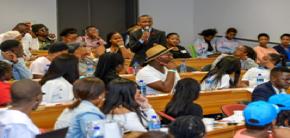TACKLING GENDER-BASED VIOLENCE
SOCIAL CONSTRUCT AMONGST MEN WITHIN HIGHER EDUCATION
PROBLEM STATEMENT
Statistics on Gender-Based Violence (GBV) in South Africa are relatively high and the higher learning institutions are also affected. Women in SA are disproportionately at risk of becoming victims of gender-based violence. There is therefore an urgent need for RADICAL and PERSISTENT responses, focusing on educating young men to become socially responsible participants.
How this is achieved
• Active mobilization of male students on campus
• Work together on solutions
• Engage on various platforms
• Take ownership of pertinent psycho-social issues on campus
• Robustly challenge gender inequalities
• Collaborate with all students in leadership
AMAJITA’S MEN’S PROGRAMME (AMP) OBJECTIVES
AMP serves as a platform to bring together young men in higher learning to:
Act responsibly
Be at the forefront in the fight against GBV
Change social construct among young men
Become good citizens as men
Focussed interventions
• Educate one another about “normalized” social ills which are criminal offences by law
• Unlearn what was entrenched in us as males
• Promote access to health-seeking programs and services
• Encourage male students to do their part and prevent GBV against women and girls
• Promote the message that women play an integral role in society!
Responses of Amajita’s Men’s Programme in addressing GBV
SILENT PROTEST
• CPUT geared up for a silent protest to demonstrate support for victims of GBV
• For maximum effect campuses demonstrated same date and time 2019
• Purple ribbons wrapped around 400 trees across all campuses.
• Actively mobilized male participation
Re-engineering of Amajita’s Programme 2020 webinar
To
Inspire,
Reflect
THE WAY FORWARD
“Addressing cultural diversity in ensuring we embrace our differences and mobilize other men to be part of the movement which fights against GBV so it can be a continuous approach that’s meant to mentor and shape young men from their early years until the exit level of higher institution of learning to benefit their workspace and their communities” (Smail, 2019)
FOCUS AREAS
Finding our role in society as men
Addressing’s Societal Norms
Challenging institutions and toxic masculinity
Fundamental factors causing the problems men face
Family structural background
(Unlearning the past)
Educating High school boys
Addressing the types of abuse
PLANNED INTERVENTIONS
Provide men’s support programmes/training/ interventions
Address GBV prevalence on and off-campus
Coordinate male and female dialogues on & off campus
Identify and recruit campus champion(s)
Draft a social conflict resolution document in line with GBV Policy
Mentoring programme for male first year students (semester program)
Gender-Based Violence dialogue
• Called for heightened oversight
• Review of existing policies and disciplinary codes
• Bridge the gap in policy reform
• Need for champions: Chancellors, Rectorates, DVCs, Faculty Deans, Senior Management Teams and other Statutory Bodies.
Some Quotes/statements made:
“GBV is the new silent pandemic that required everyone to be activists in their homes. “The real solution to GBV lies with men, men should tell perpetrators that they will expose them” - Prem Coopoo, CPUT’s Dean of Students.
“Support should be given to victims of GBV and that the greatest travesty of justice is when anyone approaches victims of rape and GBV to withdraw charges against their perpetrators”.
Sixolile Ngcobo, CGE’s Provincial Manager, “Now is the time to take action and for individuals to realize that solutions to GBV begin with their actions and reactions”.
SWOT analysis
STRENGTHS
The programme is known by students
Objectives are understood by men
Unity among CPUT students and staff on implementing objectives of the programme is visible
OPPORTUNITIES
There’s a clear way forward
Social media mobilization has increased
Invite male members of EM and Council to be speakers at the dialogues
Invite a public figure to join as speakers
Increase awareness amongst all males
Conduct a gap analysis
WEAKNESSES
Too few male participants engaged during the webinar Few men want to be at the forefront of the program
THREATS
Not having residence Amajita’s champions doesn’t allow us to have clear access to residences students and many campuses













